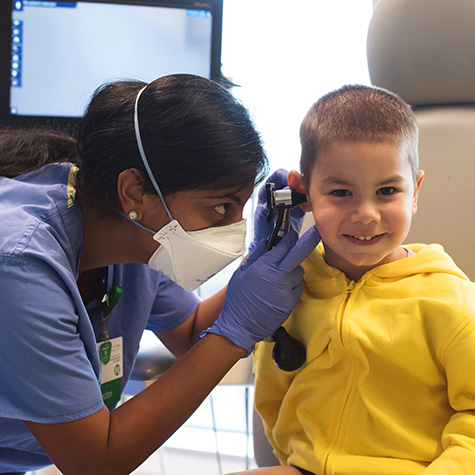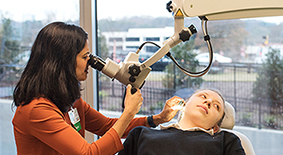What Are Sinus Infections, and How Can Surgery Help My Child?
Updated 12/1/21
Sinus infections can be common in kids, but if your child has recurring sinus infections or sinus infections that don’t respond to the treatments your child’s doctor prescribes, it may be time to consider sinus surgery.
Sinus infections are a fairly common, but uncomfortable, childhood ailment occurring in about 5 to 10 percent of upper respiratory infections. Sinus infections in kids usually resolve with medication and time, but in some cases, surgery is the best option to keep sinus infections at bay for the long haul.

Pediatric sinus surgery involves a procedure called nasal endoscopy, in which an otolaryngologist (also called an ear, nose and throat doctor, or ENT) inserts a thin instrument into a child’s nostrils to remove blockages. Children may need sinus surgery if they:
- Suffer from recurrent or chronic sinus infections (also known as chronic sinusitis).
- Develop complications from a sinus infection.
- Develop nasal polyps from allergies.
- Have cystic fibrosis.
“Patients who have recurring sinus infections that don’t get better with antibiotics, steroids, and nasal saline spray may require surgery,” says Sean Evans, MD, a pediatric otolaryngologist at Children’s Healthcare of Atlanta. Younger children typically don’t need sinus surgery, since the sinuses develop throughout childhood.
Let’s back up and look at sinuses themselves. Located in a person’s cheeks, between and above the eyes, and deep in the back of the nose, sinuses are air-filled, mucus-lined cavities that help trap foreign objects and bacteria. (We tend to only notice them when they’re causing problems.)
The sinus cavities are large but drain through very small openings. “When the drainage pathway becomes obstructed, or blocked, fluid can build up and create the perfect environment for bacteria to flourish in, resulting in a sinus infection,” says Dr. Evans.
Allergies and sinusitis in kids
If your little one constantly has an inflamed nose without being sick, schedule a visit with an allergist. Allergies are a common cause of chronic sinusitis in kids, but sinus surgery for allergies is not effective if exposure to an allergen goes unchecked.
During endoscopic sinus surgery, the ENT inserts special fiber-optic cameras and instruments into the child’s nasal passages while the child sleeps under anesthesia. The physician removes any infection, trapped mucus, or other obstruction (such as nasal polyps), allowing fluid to escape the sinuses as it should. No external incisions are required, and the procedure typically takes one to three hours.
Recovery from sinus surgery
Pain after pediatric sinus surgery is usually mild and short-lived, says Dr. Evans. Kids may experience the following:
- Small amounts of blood or crusting may come out the nose as part of the natural healing process.
- Most patients will be started on saline “irrigation,” in which they flush out their nose with a saltwater solution to help heal the inflamed sinus.
- The child may be prescribed brief courses of antibiotics or steroids.
- As with any surgery, scarring is possible, which could result in less effective sinus drainage. This typically happens in less than 10 to 15 percent of cases.
After sinus surgery, children can suffer from sinus infections again, notes Dr. Evans. The patients most at risk for developing sinus infections after sinus surgery are those with chronic conditions such as cystic fibrosis or severe allergies.

When it comes to your child, where you take them matters.
If your child has ear infections, strep throat or other issues that impact their ears, nose or throat, find a pediatric otolaryngologist or click the link below to schedule an appointment.
Make an AppointmentSean Spencer Evans, MD, is a pediatric otolaryngologist at Children's Healthcare of Atlanta. Dr. Evans joined Children's in 2020 after completing a complex pediatric otolaryngology fellowship training at Seattle Children's Hospital. Prior to his fellowship, Dr. Evans completed his residency training at the University of Alabama at Birmingham and received his medical degree at Tulane University School of Medicine. Throughout his training, Dr. Evans has received numerous scholarships and awards for his clinical, research and teaching pursuits. Dr. Evans has also participated in medical missions to the Philippines, scholarly work in South Korea and surgical education of otolaryngology residents in Costa Rica.
This content is general information and is not specific medical advice. Always consult with a doctor or healthcare provider if you have any questions or concerns about the health of a child. In case of an urgent concern or emergency, call 911 or go to the nearest emergency department right away. Some physicians and affiliated healthcare professionals on the Children’s Healthcare of Atlanta team are independent providers and are not our employees.
Contact Us 404-785-KIDS (5437)




